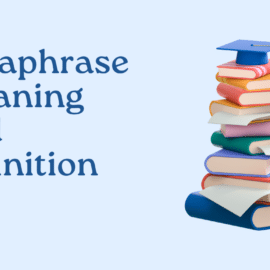
Definition
- To write something again while retaining its meaning and tone.
- To revise an existing idea, text or sentence to use in another publication.
- To alter the words and structure of an existing material.
Kids Definition
- To write someone’s idea differently.
Meaning
Rewrite entails changing the text’s language, sentence building, or style without compromising its intention.
Rewriting is a helpful technique for authors, students, researchers, and professionals who want to rewrite pieces of literary work to improve its readability or to target a different audience. It can also be viewed in this light as an innovative and productive activity that improves written content while ensuring that it continues to be educative, intriguing, and accurate.
Verb Forms
The simple past: Rewrote
Present participle: Rewriting
third-person singular simple present: Rewrites
Synonyms
- Rephrase
- Reword
- Alter
- Swap
- Revise
Why Rewriting is Important?
- It improves clarity
- Enhances readability
- Error Corrections
- Improving style
- Adapting to different audiences
- Tone changes
Examples
Rewrite the story to make it more exciting.
She asked him to rewrite his essay for clarity.
The teacher told us to rewrite the paragraph.
He will rewrite the script to fix the mistakes.
They decided to rewrite the ending of the book.
Examples From Publications
It Is Never Too Late to Turn the Page and Rewrite the Story of Your Life
Check your name and the names of your co-authors for accuracy. If there is a factual or typographical error in the proofs, please correct this but do not rewrite the text
Rewriting, as many successful authors have stated, is the essence of good writing.


